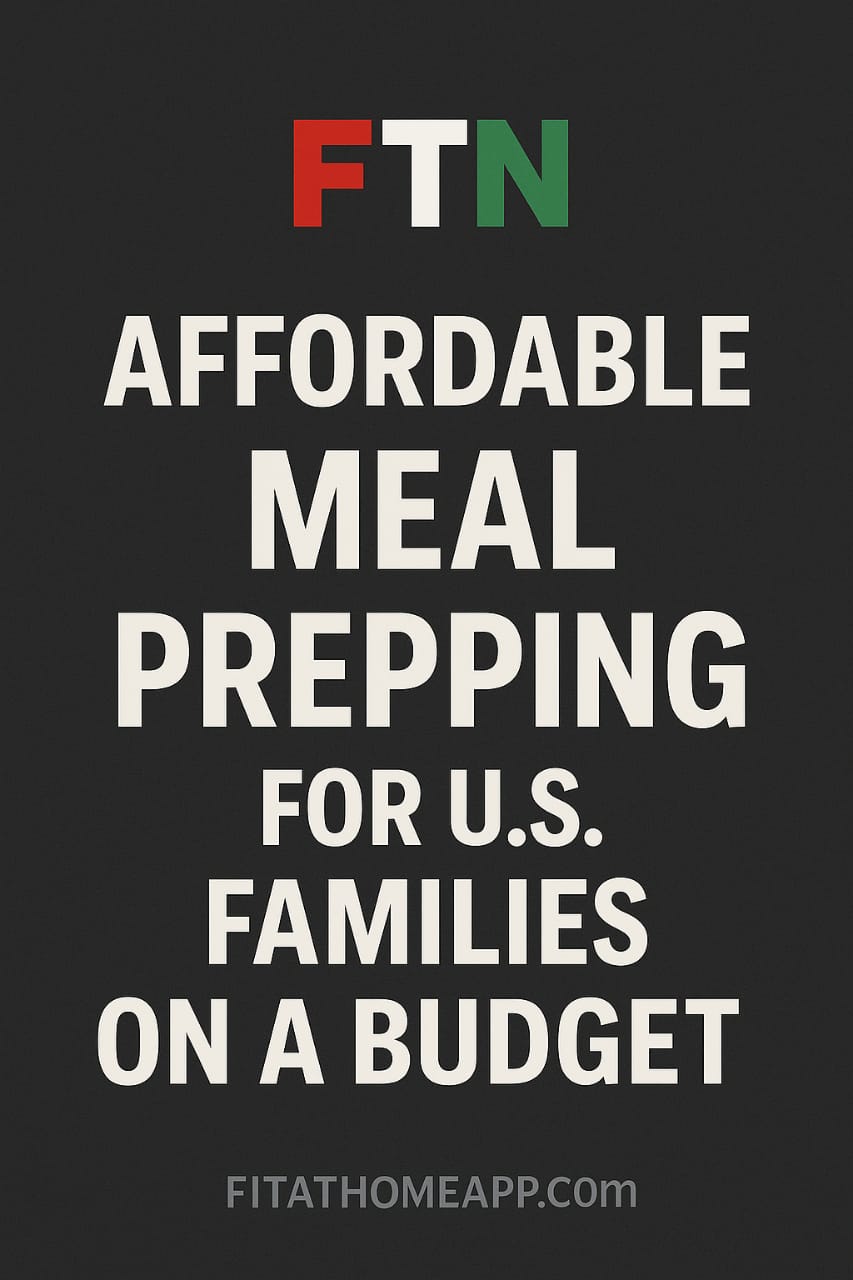🧠 Understanding Meal Prepping
Meal prepping is more than just a kitchen trend — it’s a smart, budget-friendly strategy for American families 🥦💡. It involves planning meals ahead of time, cooking in bulk, and storing individual portions for easy access throughout the week.
This method helps families:
✅ Save money by avoiding spontaneous takeout
✅ Eat healthier by controlling ingredients and portions
✅ Reduce food waste by using up ingredients before they spoil
Setting aside just a few hours once a week can make a huge difference in your family’s health and budget. Prepping meals encourages smarter shopping, healthier eating habits, and stress-free mealtimes 🛒🥗.
🛍️ Budget-Friendly Ingredients & Smart Shopping Tips
When prepping meals on a budget, choosing affordable and versatile ingredients is key. Here are some low-cost staples that provide excellent nutrition:
🍚 Brown rice and whole grain pasta
🥫 Canned beans and lentils
🥔 Potatoes, carrots, and other hearty root vegetables
🧂 Basic herbs and spices for flavor
🥚 Eggs, peanut butter, and low-cost proteins
🛒 Smart Shopping Tips:
Buy in bulk when possible, especially dry goods and frozen produce
Shop seasonally — fruits and veggies in season are cheaper and fresher 🍓🌽
Use store circulars, digital coupons, and discount apps 📱
Choose generic/store brands for staples
Planning meals based on weekly sales is a great way to stay creative in the kitchen while sticking to your budget 💸.
📝 Practical Meal Prep Strategies for Families
Effective meal prepping starts with a plan. Here’s how families can stay organized and stress-free:
Pick Your Prep Day: Sunday is a popular choice. Set aside 2–3 hours to cook and portion meals 👩🍳📆
Create a Weekly Menu: Include breakfast, lunch, dinner, and snacks for the entire week 📋
Make a Precise Grocery List: Stick to it to avoid impulse purchases and food waste 🛍️✍️
Batch Cook and Store: Cook large batches of meals like soups, stews, casseroles, and grains. Use freezer-safe containers for longevity ❄️
Label Everything: Use masking tape or labels to note what’s inside and the prep date 📅✅
Clear containers help keep the fridge organized and make it easy to grab meals on busy weekdays. Meal prepping also reduces the temptation to eat out, which further protects your budget 👨👩👧👦🍲.
🍲 Quick & Easy Budget Meal Prep Recipes
Here are 3 delicious and budget-friendly recipes perfect for meal prepping:
1. 🥦 One-Pot Veggie Stir Fry
Ingredients: bell peppers, carrots, broccoli, cooked brown rice, soy sauce, garlic, olive oil
Instructions: Sauté veggies in oil, add rice and seasonings. Cook for 10–15 minutes.
Stores well in the fridge for 4–5 days. A colorful, affordable, and nutritious lunch option.
2. 🍲 Lentil & Vegetable Soup
Ingredients: lentils, diced tomatoes, celery, onion, vegetable broth, thyme, bay leaves
Instructions: Simmer everything together for 40 minutes until soft. Freeze individual portions.
Great for lunches and dinners. High in fiber and protein.
3. 🌮 Chicken Taco Bowls
Ingredients: ground chicken or turkey, taco seasoning, black beans, corn, rice, avocado
Instructions: Cook chicken with seasoning, layer with other ingredients in containers.
Separate ingredients for freshness. Makes a tasty, balanced meal for the week.
♻️ Reducing Waste & Increasing Savings
Meal prepping not only saves money — it helps reduce food waste 🍌🚫. By using what’s already in the fridge or pantry, families waste less and stretch their grocery dollars further. It also means fewer last-minute grocery runs and less temptation to eat out.
Some helpful practices include:
Planning meals around ingredients you already have
Freezing leftovers or surplus items before they spoil
Repurposing ingredients across multiple meals (e.g., rice or roasted vegetables)
Meal prepping encourages sustainability while supporting both financial and nutritional health 🌍💪.
🏁 Conclusion: A Healthy Routine on a Budget
Meal prepping is a powerful tool for U.S. families looking to stay healthy and save money 💵🍎. With a bit of organization, the right ingredients, and smart shopping habits, families can enjoy:
Balanced, home-cooked meals
Reduced grocery bills
Less food waste
More quality time together
Whether you’re a busy parent, a college student, or just looking to simplify your meals, affordable meal prepping offers a path to better living — without breaking the bank 🏡❤️.
Personal Insight:
I found the video highly motivating—its step-by-step layout, cost breakdowns, and realistic meal ideas make meal prepping feel achievable for families on tight schedules and budgets.
Suggestions to Elevate It Further:
- Include Budget Callouts
Add pop-ups like:
“All meals under $4 each!”
“Prep time: 2 hours on Sunday”
- Visual Meal Breakdown
Show a quick fridge/freezer shot with labeled containers, making the outcome tangible and appealing. - Add Portion & Serving Tips
Insert notes like:
“Feeds 4–5, great for leftovers”
“Freeze half, refrigerate half”
- Dietary Swaps
Suggest alternatives such as:
Swap chicken for beans to lower cost
Use seasonal produce for freshness and affordability

